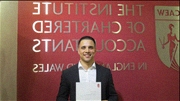Tutor HuntResources ACA Resources
How To Pass Aca Professional Level Exams
Summary This article explains offers advice on how students should prepare for the Professional Level ACA exams. Written by the ICAEW Professional Level prize winner and an ACA tutor who has a 98% student pass rate, this is a must read for any student about to start preparing for their Professional Level exams.
Date : 04/08/2017
Author Information

Uploaded by : Kieran
Uploaded on : 04/08/2017
Subject : ACA
The Professional Level exams are a major step up from Certificate level in terms of the level of technical content, complexity of the exam paper questions and the time pressure faced in the exam. Even when students get their head around the advanced technical concepts, they often fall short when it comes to practically applying this knowledge to exam questions especially when the examiner actively tries to create scenarios which are unpredictable. These difficulties are represented in the fact that pass rates for the Professional Level exams are usually between 65% and 90%, with some exams, such as Business Planning: Tax (BPT), typically being at the lower end of this range and others, such as Business Strategy (BS), typically being at the top end. Such pressure is only intensified by the fact that students may lose their job if they fail an exam multiple times and have to start the ACA from scratch if they fail an exam 4 times.
Both as a student and a tutor, I have spent time developing the optimal approach to each ACA Professional Level exam this includes the most effective ways to study, how best to tackle each specific type of exam question and the most advantageous way to utilise your time in the exam. Not only did this optimal approach result in me scoring c.90% for the Professional Level exams and winning the ICAEW BBH Professional Stage Prize, but it has enabled my students to achieve a near 100% pass rate for the Professional Level exams. This is particularly impressive given that the vast majority of my students had previously failed with a large classroom tuition provider. In order to pass the Professional Level exams, you need to develop 2 key skills. Firstly, you need a developed understanding of the technical concepts and to be able to apply this to complex, practical scenarios. Secondly, you need an exam technique will allows you to complete the exam within the time limit whilst also writing all the points which will be on the mark scheme.In order to develop the first skill, rather than racing through each of the study manual chapters using small, unexaminable examples (like large classroom tuition providers), you need to break the syllabus down into examinable areas based on the questions which will appear in your exam. For example, if you are studying Tax Compliance, then you need to structure your learning around each type of tax as this how the exam paper is structured, rather than working through on a chapter by chapter basis. Similarly, if you are studying Financial Accounting and Reporting, then your revision should be broken down into Single entity accounts, explain IFRS treatment and Consolidation. In order to help you reach peak performance as quickly as possible, you should supplement your technical learning with exclusive use of real past paper exam questions (these are the questions in the ICAEW question bank which have a date next to them in the contents page). This enables you to get to exam standard as quickly as possible rather than wasting time with sub-standard warm-up questions which can result in false confidence. The second skill of exam technique development is often neglected at large classroom tuition providers, probably due to the fact that it is not practically possible to develop individual students in such a large class. Exam technique is a fundamental part of exam success as having technical knowledge alone will not get you through the exam. In order to pass, you need to have optimal exam technique so that you can demonstrate your knowledge as efficiently as possible whilst allowing sufficient time to complete the paper in full. The key skills you need to develop include being able to identify from the requirement wording exactly what the examiner wants to see in see in your answer, actively reading the exam paper information to see how each section will feed into your answer, utilising the exam paper information to ensure that your answer relates specifically to the company in question, being able to leverage one part of your answer to another in order to save time. The above advice is generic for the 6 Professional Level exams. I have developed an optimal exam technique for each Professional Level paper having completed the past papers for every Professional Level exam. Whilst there is not scope to go into detail on each paper, one thing I can say is that I have observed striking patterns in the mark schemes over time and a student s exam technique can be a significant factor in determining the level of marks awarded.This resource was uploaded by: Kieran
